Marine Life & Conservation
The Maldivian Coral Carers – An insight into Active Coral Restoration Techniques
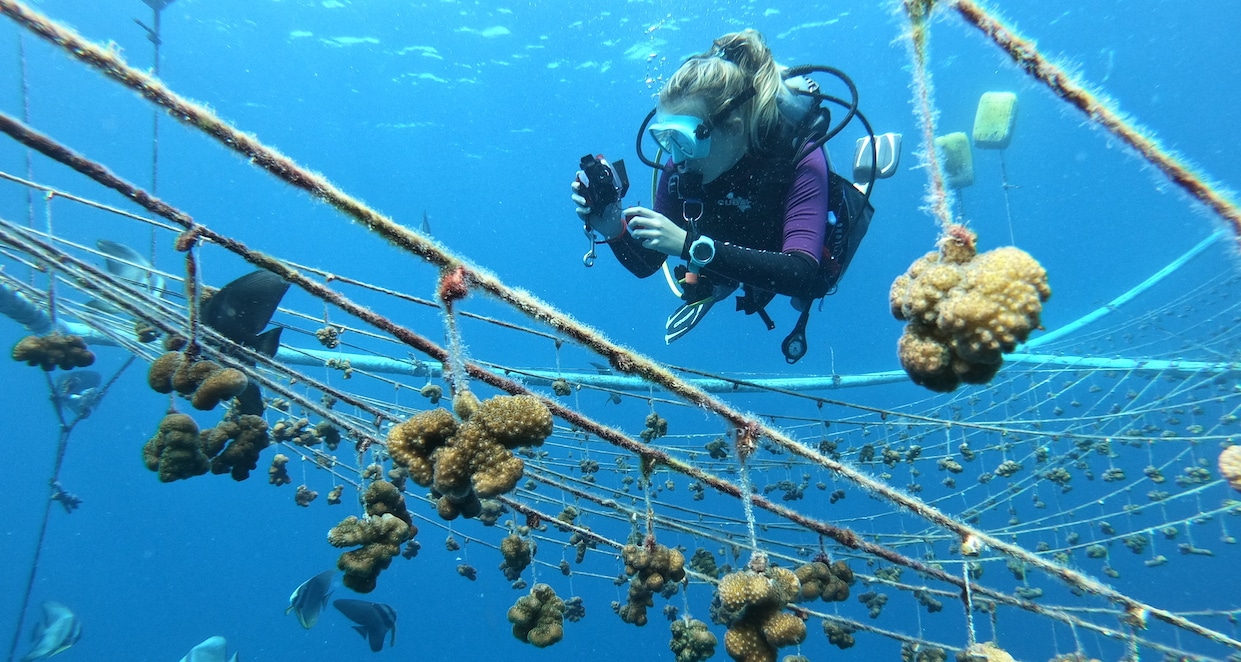
A guest post for Scubaverse by Chloe Brown.
Chloe is a graduate from the University of Southampton where she studied for a BSc Oceanography. She started her diving career whilst studying, which led to her current job working for Velaa Private Island in the Maldives. Chloe works together with the resident marine biologist and coral biologist restoring the house reef while conducting new innovative research to improve restoration techniques.
The reality of climate change beneath the waves is more detrimental than the majority are aware. Among all the reefs found across the globe, 50% have been destroyed in recent years in response to anthropogenic stressors. Unfortunately, these beautiful habitats are tucked away and the effects easily go unnoticed, deteriorating further. This is not the case for the diving community who are unfortunately witnessing this rapid decline in corals and marine life. Therefore, multiple restoration efforts worldwide have jumped in to attempt to restore one of the world’s greatest wonders, before it is too late.
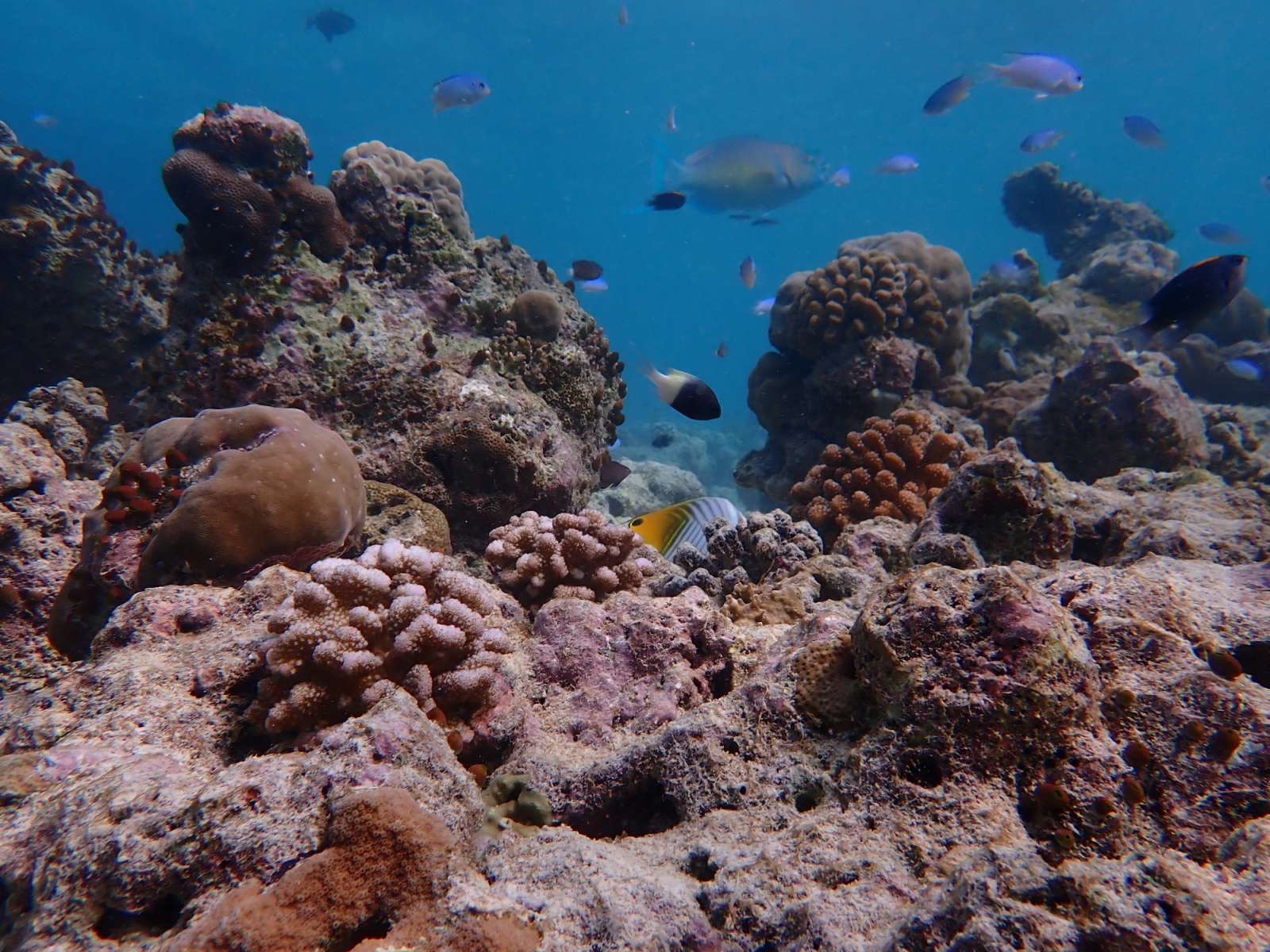
Restoration Techniques
Coral restoration initiatives aim to restore the overall health, abundance, and biodiversity improving the reef’s tolerance to external stressors. The process behind this is to utilize the existing corals to clone them and repopulate the reef. The fact these corals are still surviving on the reefs, despite the natural disturbances, indicates strong resilient characteristics that are very valuable to restoration projects. These corals act as “donor colonies” as small fragments are broken off to be grown in nurseries and later transplanted back onto the reef.
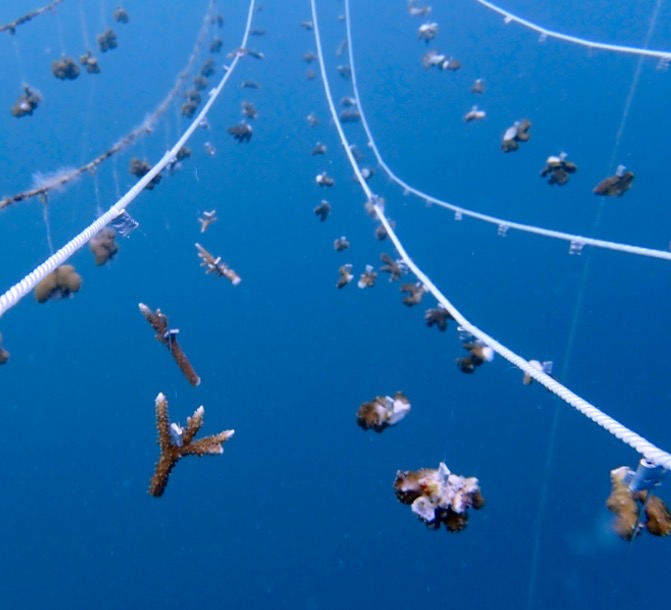
Here at Velaa Private Island, we use the floating mid-water nursery set up. These consist of 1,500 corals and we currently have two of these nurseries in place. Our nurseries mainly hold Pocillopora spp. as it is extremely tolerable with a high prevalence rate. We attach the small fragments taken from the donor colonies with monofilament and crimps to the nurseries, where they grow for a year. This nursery is situated at a depth of 8m (anchored at 30m) and located away from the reef. Growing away from the reef reduces predation, moderates competition, and allows depth alterations during warmer months to mitigate bleaching effects. Other key nursery designs are being trialed by other restoration efforts worldwide. These include coral trees, net nurseries, and ex-situ nurseries in laboratories, where the conditions can be monitored and controlled 24 hours a day.
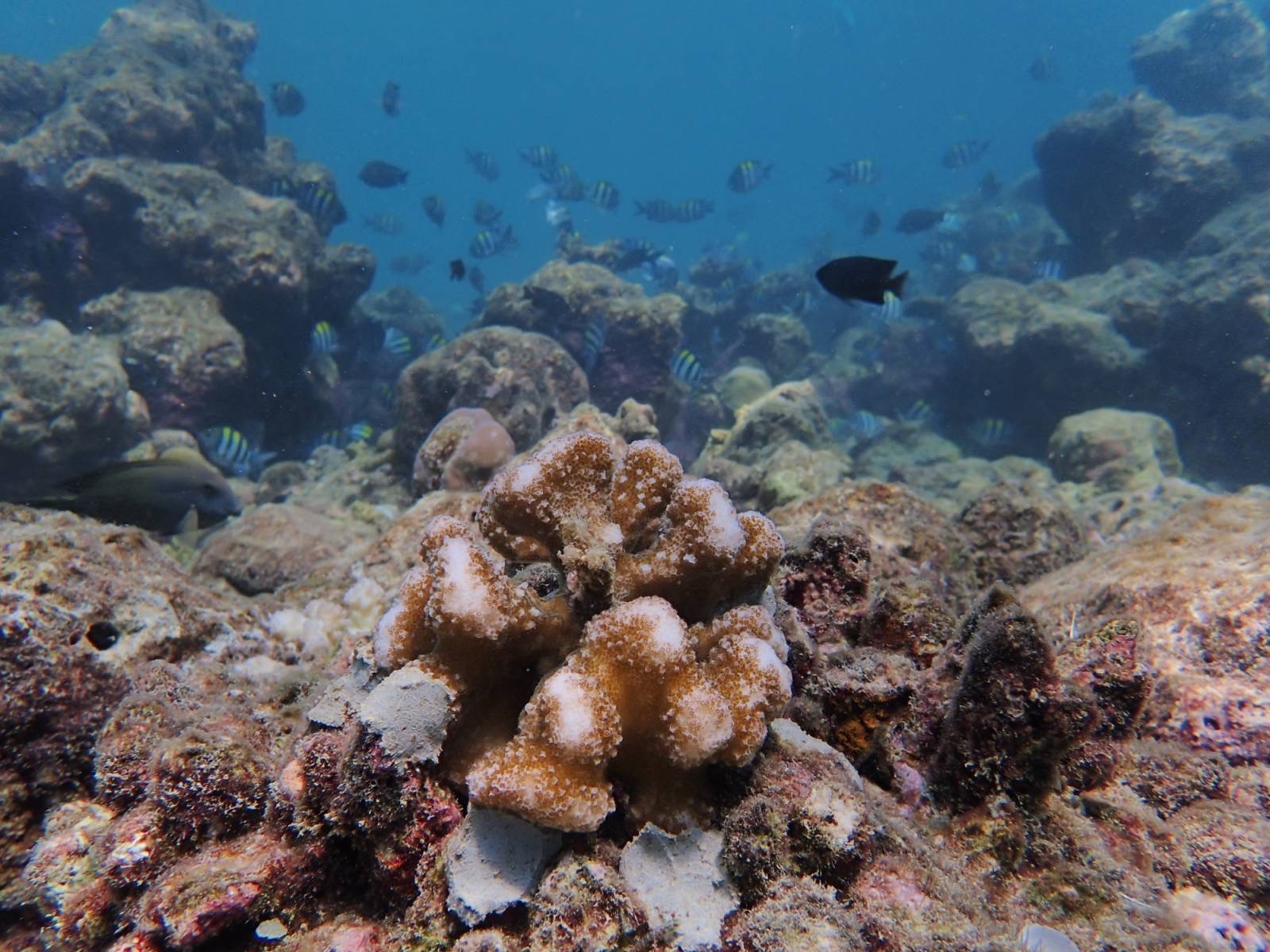
During transplantation, we use marine cement to attach the corals to rocks and other hard surfaces found along the reef. Over time these corals will propagate outwards via asexual reproduction growing over the adhesives securing themselves on to the reef.We have successfully transplanted over 4,500 corals with a 70% survival rate. This has had a great effect on increasing the abundance and diversity of marine life present on the reef.
We have additionally conducted further research into effective ways to restore species diversity, specifically looking at massive species. It was found that massive coral species survive better when the fragments are transplanted directly onto the reef, skipping the nursery phase entirely. The ideal fragment size should be 1-2cm and attached to the substrate 1cm away from its clones, to allow fusion with growth. It was Dr. Vaughn who discovered that massive coral species grow quicker when they are cut into smaller fragments. He also discovered tissue fusion between clones however, his finding was taken from ex-situ experiments. It’s fantastic to see similar results in-situ with all the natural disturbances prevailing. The overall aim of restoration is to rehabilitate the reefs encouraging natural growth and self-sufficiency. We have certainly seen this as there was higher recruitment (coral larvae settlement) number in the transplant sites compared to the untouched degraded sites. Self-generation has been evident.
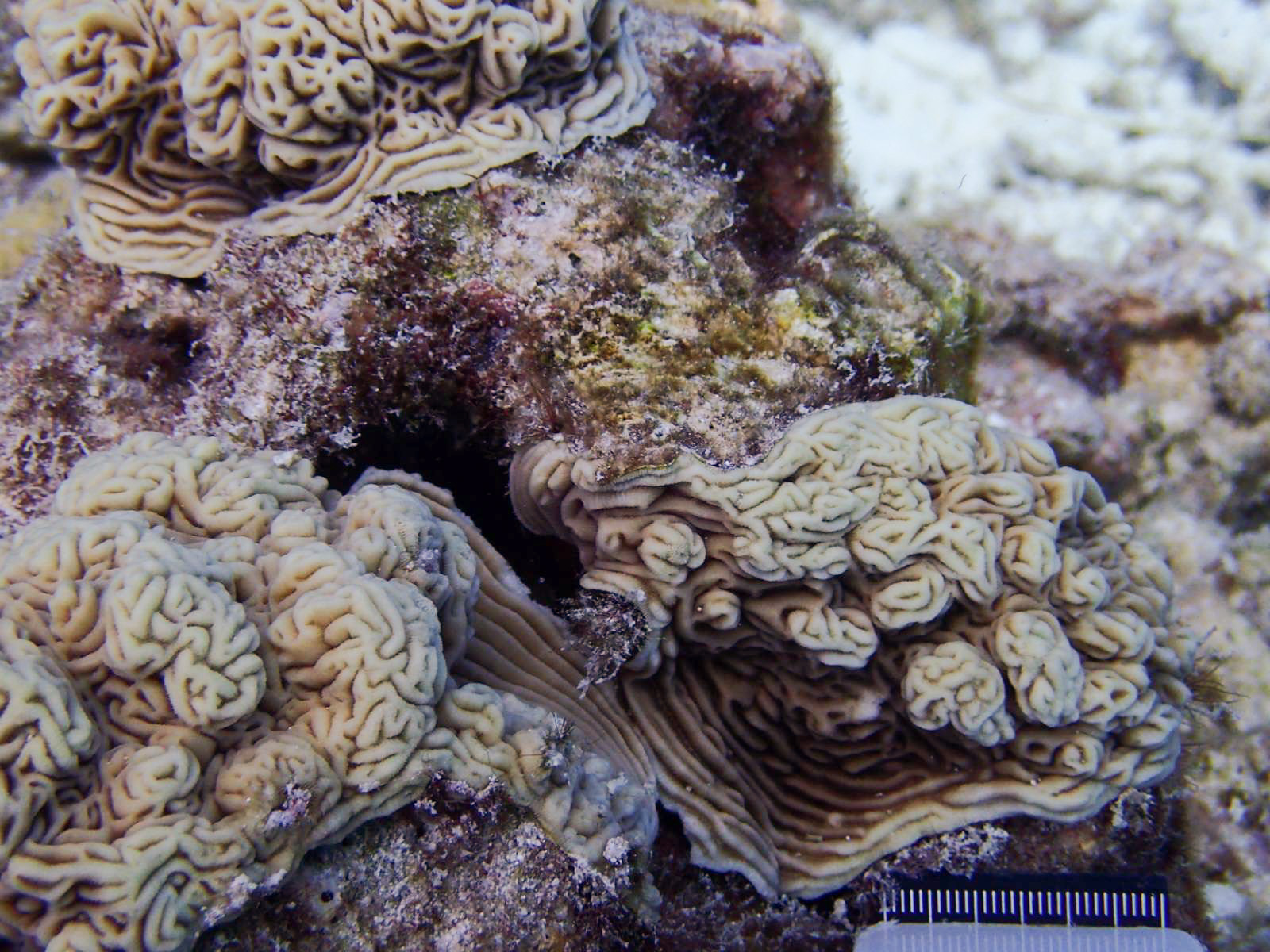
This is an insight into a few techniques used by restoration projects. Without reef restoration, it is predicted that a complete loss of coral reefs will be seen in the next 30 years, taking away, the home to 25% of all marine life. This signifies the importance of restoration and future conservation measures. To ensure the sustainability of restoration efforts education and awareness need to be conducted. Awareness needs to be ubiquitous as it is not just those living along the coasts who have an impact on the oceans, it’s everyone. People need to be taught about the reality of the ocean to induce a permanent change; otherwise coral reefs will lose the fight against mankind taking the marine life with it.
If you are interested in the work we are doing or just want to see some awesome underwater shots of marine life check out our Instagram page @velaacoralproject. We will be delighted to have you.
Blogs
The Ocean Cleanup Breaks 10,000,000 KG Barrier

The Ocean Cleanup, the global non-profit project, has removed a verified all-time total of ten million kilograms (22 million lbs.) of trash from oceans and rivers around the world – approximately the same weight as the Eiffel Tower.
To complete its mission of ridding the oceans of plastic, The Ocean Cleanup uses a dual strategy: cleaning up the Great Pacific Garbage Patch (GPGP) to remove the plastic already afloat in the oceans, while stopping the flow of plastic from the world’s most polluting rivers.
Through cleaning operations in the GPGP and in rivers in eight countries, the cumulative total of trash removed has now surpassed ten million kilograms. This milestone demonstrates the acceleration of The Ocean Cleanup’s impact, while underlining the astonishing scale of the plastic pollution problem and the need for continued support and action.
While encouraging for the mission, this milestone is only a staging point: millions more tons of plastic still pollute our oceans and The Ocean Cleanup intends to continue learning, improving and innovating to solve this global catastrophe.
This announcement comes as governments from around the world meet to continue negotiations to develop a new legally binding instrument to end plastic pollution at INC4 in Ottawa, Canada. Representatives of The Ocean Cleanup will be in attendance and the organization will be urging decision-makers to collaborate towards a comprehensive and ambitious global treaty which addresses plastic at all stages of its life cycle and in all marine environments worldwide, including in areas beyond national jurisdiction.
It is encouraging to see that the need for remediation is reflected in the various options for potential treaty provisions. It is essential that the final treaty contains clear targets for the remediation of legacy plastic pollution, and reduction of riverine plastic emissions.
Tackling plastic pollution requires innovative and impactful solutions. The treaty should therefore incentivize the innovation ecosystem by fostering innovations that make maximal use of data, technology and scientific knowledge – such as those designed and deployed by The Ocean Cleanup.
‘After many tough years of trial and error, it’s amazing to see our work is starting to pay off – and I am proud of the team who has brought us to this point.’ said Boyan Slat, Founder and CEO of The Ocean Cleanup. ‘While we still have a long way to go, our recent successes fill us with renewed confidence that the oceans can be cleaned.’
The Ocean Cleanup was founded in 2013 and captured its first plastic in 2019, with the first confirmed catch in the GPGP coming soon after the deployment of Interceptor 001 in Jakarta, Indonesia. After surpassing one million kilograms of trash removed in early 2022, the non-profit project has since progressed to the third iteration of its GPGP cleaning solution, known as System 03, and a network of Interceptors currently covering rivers in eight countries, with more deployments set for 2024.
About The Ocean Cleanup
The Ocean Cleanup is an international non-profit organization that develops and scales technologies to rid the world’s oceans of plastic. They aim to achieve this goal through a dual strategy: stemming the inflow via rivers and cleaning up the legacy plastic that has already accumulated in the ocean. For the latter, The Ocean Cleanup develops large-scale systems to efficiently concentrate the plastic for periodic removal. This plastic is tracked and traced through DNV’s chain of custody model to certify claims of origin when recycling it into new products. To curb the tide via rivers, The Ocean Cleanup has developed Interceptor™ solutions to halt and extract riverine plastic before it reaches the ocean. Founded in 2013 by Boyan Slat, The Ocean Cleanup now employs a broadly multi-disciplined team of approximately 140. The foundation is headquartered in Rotterdam, the Netherlands.
For more information, visit: theoceancleanup.com and follow @theoceancleanup on social media.
Marine Life & Conservation
Steve Backshall to headline Shark Trust’s flagship event: For the Love of Sharks

Join a host of amazing, shark loving, speakers including Steve Backshall and the Shark Trust team for an evening celebrating shark conservation at the Royal Geographical Society in London this November.
Date: 29th November 2024
Time: 6-10pm
Location: Royal Geographical Society, London
Tickets: https://www.sharktrust.org/Event/flos24
The event will be a celebration of all things shark. Those lucky enough to get hold of tickets will hear from engaging guest speakers with a passion for sharks.
The line-up includes (*subject to change if unforeseen circumstances arise)
Steve Backshall: One of television’s busiest presenters, BAFTA award-winning wildlife expert Steve has been passionate about the wild world ever since he was young.
Steve’s impressive TV career has taken him all around the world, investigating a wide array of species and environments. Steve has filmed over 100 hours of children’s wildlife programmes with the BAFTA award winning Deadly 60 franchise and recently, with Sky Nature, for his new series ‘Whale with Steve Backshall’. He has been a patron for the Shark Trust for 10 years.
Simon Rogerson: is a photojournalist specialising in natural history, diving and the sea.
He is editor of SCUBA magazine, the official journal of the British Sub-Aqua Club. Simon started his career as a crime reporter but gravitated towards his ‘less depressing’ interest in underwater exploration, joining the staff of DIVE magazine in 1999. In 2005 he was named ‘Editor of the Year’ in the PPA’s Independent Publishing Awards. Simon also works as a freelance writer, contributing frequently to the Sunday Times and Telegraph, in addition to BBC Wildlife, Esquire, and a host of international diving magazines. He is the author of a book, Dive Red Sea, published by Ultimate Sports. Now based in Berkshire, Simon has been a Patron of the Shark Trust for 20 years.
More speakers to be announced soon. Head to the Shark Trust website to learn more.
The evening will also allow guests the final chance to see the Oceanic 31, shark art exhibition. Some of the artwork will be auctioned/raffled at the event, while the rest will be auctioned online to raise money for the Shark Trust Oceanic Programme.
For the Love of Sharks is an evening with something for everyone who is interested and fascinated by sharks. Join the Shark Trust, their Patrons, Trustees and Staff, along with a host of supporters for this celebration of shark conservation.
For more information or to buy a ticket: https://www.sharktrust.org/Event/flos24
-

 News3 months ago
News3 months agoCapturing Critters in Lembeh Underwater Photography Workshop 2024: Event Roundup
-

 Marine Life & Conservation Blogs3 months ago
Marine Life & Conservation Blogs3 months agoCreature Feature: Swell Sharks
-

 Gear Reviews4 weeks ago
Gear Reviews4 weeks agoGEAR REVIEW – Revolutionising Diving Comfort: The Sharkskin T2 Chillproof Suit
-

 Blogs2 months ago
Blogs2 months agoMurex Resorts: Passport to Paradise!
-

 Blogs3 months ago
Blogs3 months agoDiver Discovering Whale Skeletons Beneath Ice Judged World’s Best Underwater Photograph
-

 News3 months ago
News3 months agoPADI Teams Up with Wellness Brand Neuro to Drive Ocean Change and Create a Blue State of Mind
-

 Gear Reviews3 months ago
Gear Reviews3 months agoGear Review: Oceanic+ Dive Housing for iPhone
-

 Marine Life & Conservation2 months ago
Marine Life & Conservation2 months agoSave the Manatee Club launches brand new webcams at Silver Springs State Park, Florida





